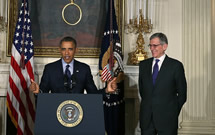How will FCC Chairman Wheeler’s telecom experience impact ed-tech initiatives?
 Ed-tech advocacy groups reacted to the confirmation of Tom Wheeler as Federal Communications Commission (FCC) chairman, noting that the official move positions the agency to better act on pressing broadband connectivity and eRate needs.
Ed-tech advocacy groups reacted to the confirmation of Tom Wheeler as Federal Communications Commission (FCC) chairman, noting that the official move positions the agency to better act on pressing broadband connectivity and eRate needs.
Wheeler, the 31st chairman, has previously worked in various telecommunications companies and associations, such as Shiloh Group and the National Cable Television Association, for more than 30 years.
“Former Chairman Genachowski put us all on a course to a better broadband future and I am very cognizant that we are all building on his accomplishments,” Wheeler said during Nov. 5 comments to FCC staff.
(Next page: Ed-tech groups react to Wheeler’s confirmation)
“I believe we are the ‘Optimism Agency’ of the federal government. The connective technology that will define the 21st century flows through the FCC. In so many ways our new networks are integral to challenges as diverse as education, energy, and health care. The 21st century economy begins here,” he said.
Confirmed along with Wheeler was Commissioner Michael O’Rielly, which means that the FCC is again operating with five commissioners (three Democrats and two Republicans), which experts say makes the FCC better equipped to work on a number of issues that experts say have stalled since former Chairman Julius Genachowski and Commissioner Robert McDowell announced their resignations in March.
Ed-tech stakeholders said the confirmation paves the way for more work on helping schools across the nation have access to high-speed, reliable broadband.
“SETDA congratulates new FCC Chairman Tom Wheeler on his unanimous confirmation and clear intent to continue forward momentum on the range of important issues before the Commission. We look forward to working with him and the Commission to protect the eRate program’s accomplishments, build on them, and put it on a course to providing gigabit broadband speeds and greater educational opportunities for all of the nation’s students,” said Doug Levin, CEO of the State Educational Technology Directors Association (SETDA), in a statement. “SETDA also congratulates Michael O’Reilly on his confirmation as FCC Commissioner, and is grateful to acting-Chairwoman Clyburn for her leadership during the appointment and confirmation process, especially in launching the eRate modernization proceedings.”
Now that the FCC has a chairman, it can “move aggressively on the eRate modernization, and the agency will hopefully listen to the educational community about the need for more investment in broadband and wireless,” said Keith Krueger, CEO of the Consortium for School Networking. “Wheeler has certainly been a player in telecom for decades in Washington, and it will be good to have an experienced hand there. There are five commissioners again, and we’re back on track.”
Mark MacCarthy, vice president of public policy at the Software and Information Industry Association (SIIA), said SIIA welcomes Wheeler’s confirmation and is urging “prompt” action when it comes to increasing broadband access in schools and libraries.
“The new FCC Chairman has taken some good first steps. He has appointed a first-class group of senior advisers including long-time Washington public servant and communications lawyer Phil Verveer as special counsel, public interest activist Gigi Sohn as his head of external affairs, communications policy veteran Diane Cornell as special counsel, former Commerce Department official Jonathan Sallet as acting general counsel and former Democratic Chief Counsel on the House Energy and Commerce Roger Sherman as acting head of the wireless bureau. His remarks to the FCC staff contained an attractive vision of the FCC’s role in nurturing the ‘network revolution’ created by dramatic advances in communications and computer technology. SIIA congratulates him on a good beginning,” MacCarthy wrote.
Others were skeptical, noting that Wheeler’s actions will make his priorities clear.
“I have been a vocal skeptic of Chairman Wheeler’s nomination as FCC Chairman, but the true measure will be what he does going forward, not his past as chief lobbyist for the telecom corporations,” said Sascha Meinrath, New America Foundation vice president and director of the Open Technology Institute, in a statement.
“The U.S. faces substantial challenges to restore our global competitiveness. Chairman Wheeler has the opportunity to implement the key reforms necessary to improve broadband connectivity and adoption throughout the country–however, the fundamental question still remains: will Chairman Wheeler buck his former corporate clients and stand up for the public interest, or continue D.C. politics as usual?” Meinrath said.
- 4 ways to support work-based learning - April 23, 2024
- Prioritizing inclusivity in game-based learning - April 22, 2024
- Friday 5: Universal Design for Learning - April 19, 2024

Comments are closed.